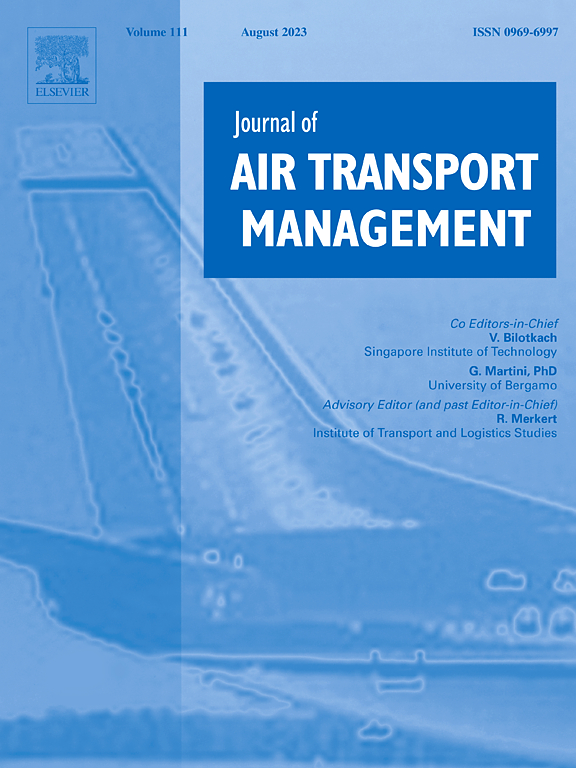Airfares adjustment to fuel price shocks: Evidence from the Brazilian airline market
IF 3.6
2区 工程技术
Q2 TRANSPORTATION
引用次数: 0
Abstract
Between January 2017 and July 2024, aviation kerosene prices experienced fluctuations due to external shocks. When the World Health Organization classified Covid-19 as a pandemic, in 2020, fuel prices fell drastically. However, as the global health crisis receded and governments abandoned mobility restrictions, demand for air travel progressively recovered. As a consequence, there was a rapid increase in prices. Additionally, in 2022, the conflict between Russia and Ukraine further intensified pressure on aviation fuel prices. Considering that fuel expenses constitute approximately one-third of airlines' cost structure, this study aims to analyze the relationship between aviation kerosene prices and domestic airfares in Brazil. The initial hypothesis suggests that, in an environment characterized by imperfect competition, the pass-through of prices between fuel costs and airfares occurs asymmetrically. Specifically, positive shocks in fuel prices would be quickly and fully reflected in airfare adjustments, while negative shocks would be delayed or have lesser impacts on airfares. However, results from a nonlinear autoregressive distributed lag (NARDL) model combined with the derivation of asymmetric cumulative multipliers do not support this hypothesis. Instead, evidence of symmetric pass-through was found, indicating that airfares respond symmetrically to fuel price shocks in the short term. Despite the dominance of only three companies in the domestic aviation market in Brazil, there are indications of fierce competition among airlines in the analyzed period. During periods of crisis, companies face difficulties in passing cost increases onto prices.
燃油价格冲击下的机票调整:来自巴西航空市场的证据
2017年1月至2024年7月期间,航空煤油价格因外部冲击而出现波动。当世界卫生组织在2020年将Covid-19列为大流行时,燃料价格大幅下跌。然而,随着全球卫生危机的消退和各国政府放弃行动限制,对航空旅行的需求逐渐恢复。结果,价格迅速上涨。此外,在2022年,俄罗斯和乌克兰的冲突进一步加剧了航空燃料价格的压力。考虑到燃油费用约占航空公司成本结构的三分之一,本研究旨在分析巴西航空煤油价格与国内机票价格之间的关系。最初的假设表明,在不完全竞争的环境中,燃料成本和机票价格之间的价格传递是不对称的。具体而言,燃油价格的正面冲击将迅速而充分地反映在机票价格调整中,而负面冲击将延迟或对机票价格的影响较小。然而,结合非对称累积乘数推导的非线性自回归分布滞后(NARDL)模型的结果不支持这一假设。相反,发现了对称传递的证据,表明机票价格在短期内对燃油价格冲击作出对称反应。尽管巴西国内航空市场只有三家公司占据主导地位,但在分析期间,航空公司之间的竞争非常激烈。在危机期间,企业难以将成本上涨转嫁到价格上。
本文章由计算机程序翻译,如有差异,请以英文原文为准。
求助全文
约1分钟内获得全文
求助全文
来源期刊

Journal of Air Transport Management
TRANSPORTATION-
CiteScore
12.40
自引率
11.70%
发文量
97
期刊介绍:
The Journal of Air Transport Management (JATM) sets out to address, through high quality research articles and authoritative commentary, the major economic, management and policy issues facing the air transport industry today. It offers practitioners and academics an international and dynamic forum for analysis and discussion of these issues, linking research and practice and stimulating interaction between the two. The refereed papers in the journal cover all the major sectors of the industry (airlines, airports, air traffic management) as well as related areas such as tourism management and logistics. Papers are blind reviewed, normally by two referees, chosen for their specialist knowledge. The journal provides independent, original and rigorous analysis in the areas of: • Policy, regulation and law • Strategy • Operations • Marketing • Economics and finance • Sustainability
 求助内容:
求助内容: 应助结果提醒方式:
应助结果提醒方式:


